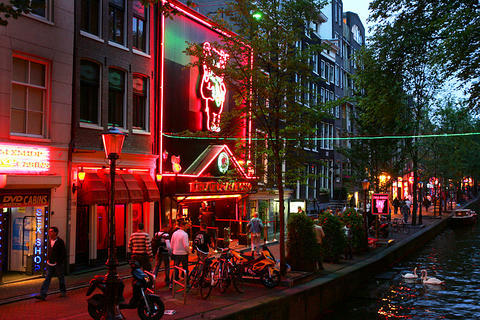The city of Amsterdam announced on Thursday that it would invest up to 15 million euros (US$21 million) to help clean up its famous red light district by buying brothels there.
The city will help a real estate developer buy 51 storefront windows where prostitutes ply their trade to convert them into apartments or commercial premises.
Although prostitution has been legal in the Netherlands since 2000, the city is trying to bring about a voluntary clean-up of Amsterdam's famous red light district.

PHOTO: AP
City mayor Job Cohen told a news conference that the deal announced on Thursday represented "a big step."
"Since the legalization in 2000, things have changed," Cohen said. "The law was created for voluntary prostitution but these days we see trafficking of women, exploitation and all kinds of criminal activity."
The Wallen, as the prostitution district is known in Dutch, is one of the oldest and most picturesque areas of Amsterdam and draws hoards of tourists, although they mainly flock there to gawk at the women.
"It is not about chasing prostitution of the Wallen, but it's about fighting crime," Cohen stressed.
City council member responsible for finance Lodewijk Asscher said closing down the prostitute windows should not have a negative impact on tourism.
"We are talking about what we call vertical drinkers, people who walk around the district drink in hand and never even sit down in the area's bars and restaurants," he said of the tourists attracted to the area.
"What's more important? A tourist attraction or women who are victims. It's modern slavery," Asscher said.
However, the Dutch sex workers' union De Rode Draad criticized the plans.
"We believe that less windows means more exploitation of women," spokeswoman Metje Blaak said.
"If the windows close down, women who are being exploited will be hidden somewhere else where union representatives and health workers can't make contact with them. The city should go after pimps, not real estate," Blaak said.
Real estate developer NV Stadsgoed agreed to pay 25 million euros to buy the storefront windows from red light district kingpin Charles Geerts.
Prostitutes hire the windows for approximately 100 euros for part of the day and one window usually has several prostitutes per day, making it a very lucrative business to hire the windows out.
The city of Amsterdam has earmarked up to 15 million euros to compensate the loss of value when the prostitutes are no longer there.
Under the deal with the municipality, Geerts is not allowed to invest the money he earns in the red light district again. Even if he invests outside the Wallen, he is not allowed to invest in prostitution, gambling or coffee shops -- cannabis cafes allowed to sell marijuana.
The 51 prostitutes' windows to be closed represent around one third of such windows in the red light district.
The city of Amsterdam last autumn announced plans to clean up the area, which has been the city's prostitution zone for more than one hundred years.

ECONOMIC WORRIES: The ruling PAP faces voters amid concerns that the city-state faces the possibility of a recession and job losses amid Washington’s tariffs Singapore yesterday finalized contestants for its general election on Saturday next week, with the ruling People’s Action Party (PAP) fielding 32 new candidates in the biggest refresh of the party that has ruled the city-state since independence in 1965. The move follows a pledge by Singaporean Prime Minister Lawrence Wong (黃循財), who took office last year and assumed the PAP leadership, to “bring in new blood, new ideas and new energy” to steer the country of 6 million people. His latest shake-up beats that of predecessors Lee Hsien Loong (李顯龍) and Goh Chok Tong (吳作棟), who replaced 24 and 11 politicians respectively

Archeologists in Peru on Thursday said they found the 5,000-year-old remains of a noblewoman at the sacred city of Caral, revealing the important role played by women in the oldest center of civilization in the Americas. “What has been discovered corresponds to a woman who apparently had elevated status, an elite woman,” archeologist David Palomino said. The mummy was found in Aspero, a sacred site within the city of Caral that was a garbage dump for more than 30 years until becoming an archeological site in the 1990s. Palomino said the carefully preserved remains, dating to 3,000BC, contained skin, part of the

Russian hackers last year targeted a Dutch public facility in the first such an attack on the lowlands country’s infrastructure, its military intelligence services said on Monday. The Netherlands remained an “interesting target country” for Moscow due to its ongoing support for Ukraine, its Hague-based international organizations, high-tech industries and harbors such as Rotterdam, the Dutch Military Intelligence and Security Service (MIVD) said in its yearly report. Last year, the MIVD “saw a Russian hacker group carry out a cyberattack against the digital control system of a public facility in the Netherlands,” MIVD Director Vice Admiral Peter Reesink said in the 52-page

‘WATER WARFARE’: A Pakistani official called India’s suspension of a 65-year-old treaty on the sharing of waters from the Indus River ‘a cowardly, illegal move’ Pakistan yesterday canceled visas for Indian nationals, closed its airspace for all Indian-owned or operated airlines, and suspended all trade with India, including to and from any third country. The retaliatory measures follow India’s decision to suspend visas for Pakistani nationals in the aftermath of a deadly attack by shooters in Kashmir that killed 26 people, mostly tourists. The rare attack on civilians shocked and outraged India and prompted calls for action against their country’s archenemy, Pakistan. New Delhi did not publicly produce evidence connecting the attack to its neighbor, but said it had “cross-border” links to Pakistan. Pakistan denied any connection to